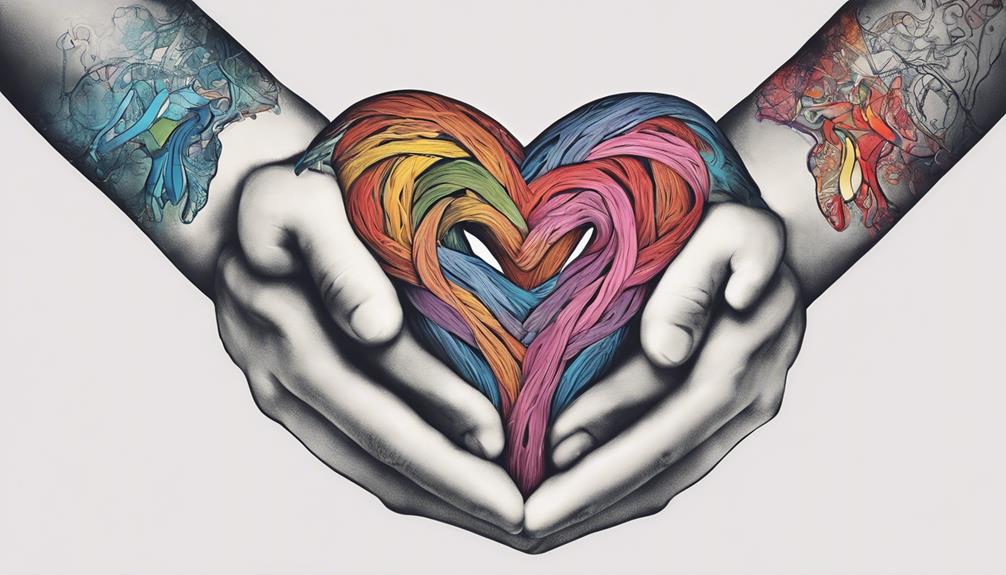When delving into the complex world of ethical non-monogamy, there are numerous valuable resources available that shed light on the complexities of various relationship dynamics.
As we navigate the complexities of modern connections, seeking guidance from reputable authors can offer a roadmap to understanding and embracing the principles of ethical non-monogamy.
These literary works serve as beacons of knowledge, shedding light on communication strategies, emotional intelligence, and the multifaceted nature of intimate connections.
Join us as we embark on a journey through the pages of these top books, where wisdom and enlightenment await those curious about the possibilities that ethical non-monogamy holds.
Key Takeaways
- Ethical non-monogamy thrives on communication, trust, and respect.
- Personal narratives humanize and provide insights into non-monogamous challenges.
- Understanding diverse perspectives and intersectionality enrich non-monogamous relationships.
- Psychological insights and emotional intelligence are essential for navigating complex relationship dynamics.
Comprehensive Guides and Manuals
Delving into the realm of ethical non-monogamy through comprehensive guides and manuals can provide invaluable insights and practical advice for navigating complex relationship dynamics. These resources offer a roadmap for those exploring open relationships, polyamory, and alternative forms of intimacy.
From 'The Ethical Slut' to 'More Than Two: A Practical Guide to Ethical Polyamory,' these guides emphasize the importance of ethical communication, trust, and mutual respect in creating fulfilling relationships outside of traditional monogamy.
Personal Stories and Memoirs

Exploring the intimate journeys shared in personal stories and memoirs of ethical non-monogamy unveils the raw emotions and transformative experiences individuals encounter in navigating unconventional forms of relationships. Memoirs provide personal insights and experiences, offering a window into the challenges, excitements, mistakes, and growth within non-monogamous setups. These books delve deep into the intricacies of communication, boundaries, jealousy, and love, providing valuable perspectives for readers seeking to understand this lifestyle. Through personal stories, individuals can relate to the struggles and joys inherent in non-monogamous relationships, finding solace in the shared human experiences. Memoirs not only humanize ethical non-monogamy but also enhance understanding and empathy, breaking stereotypes and fostering a more inclusive narrative surrounding diverse relationship structures.
- Gain insights into the challenges and growth within non-monogamous relationships.
- Understand the importance of communication and setting boundaries in these setups.
- Explore the nuances of navigating jealousy and experiencing love in non-monogamous dynamics.
- Witness firsthand the transformative power and personal growth that can arise from embracing ethical non-monogamy.
Relationship Dynamics and Communication
Understanding the intricate dance of relationship dynamics and the importance of clear communication is foundational in navigating ethical non-monogamy successfully. Effective communication plays a pivotal role in setting boundaries and managing expectations within relationships.
It's vital to comprehend the various relationship dynamics involved, such as hierarchy, autonomy, and consent, to ensure a healthy and respectful non-monogamous dynamic. Developing emotional intelligence and empathy can aid in navigating the complexities of multiple relationships, fostering understanding and connection.
Transparency and honesty are essential for building trust and maintaining the well-being of all individuals involved. Active listening and validation techniques further enhance communication, fostering deeper connections and mutual understanding in ethical non-monogamous relationships.
Intersectionality and Diverse Perspectives

Navigating ethical non-monogamy involves recognizing and embracing the diverse perspectives and intersections that shape relationships, fostering understanding and inclusivity within the dynamic landscape of intimate connections.
When exploring the realm of ethical polyamory, it's crucial to consider the following:
- Intersectionality: Understanding how various aspects of identity intersect within non-monogamous relationships is essential for creating inclusive and supportive environments.
- Race Issues: Delving into literature that tackles race issues in polyamorous dynamics can offer valuable insights into navigating diverse perspectives within relationships.
- Gender Identity: Exploring works that address gender identity within non-monogamous settings can help individuals understand and respect the complexities of diverse gender expressions.
- Family Dynamics: Considering how family dynamics influence and interact with non-monogamous relationships can lead to a deeper understanding of the challenges and joys that come with diverse family structures.
Embracing these diverse perspectives enriches the tapestry of ethical non-monogamy, allowing for greater empathy and connection within the LGBTQ+ community and beyond.
Psychological and Emotional Insights
Delving into the psychological and emotional aspects of non-monogamous relationships offers valuable insights into navigating complexities and fostering deeper connections. Understanding attachment styles, trauma-informed approaches, and personal growth within non-monogamous relationships can profoundly impact our happiness and fulfillment in life. Books like 'Smart Girl's Guide' provide strategies for creating and sustaining open, optimistic relationships by delving into conflict resolution and emotional processing. By learning about compersion and honing our communication skills, we can enhance our relationship satisfaction and cultivate a deeper sense of intimacy.
Exploring these psychological and emotional insights empowers individuals to navigate jealousy, set healthy boundaries, and cultivate self-awareness within their non-monogamous relationships. By adopting trauma-informed approaches and understanding our attachment styles, we can foster a secure emotional foundation that supports personal growth and deeper connections with our partners. Ultimately, integrating these insights into our relationships can lead to a more fulfilling and harmonious life.
Frequently Asked Questions
What Percentage of Couples Are Ethically Non-Monogamous?
We understand the curiosity about the percentage of couples practicing ethical non-monogamy.
It's estimated that around 4-5% of adults in the US are currently involved in consensual non-monogamous relationships.
However, research suggests that up to 20% of Americans have explored some form of ethical non-monogamy at some point.
These numbers highlight the growing acceptance and diversity in relationship structures within our society.
How Do You Become Ethically Non-Monogamous?
To become ethically non-monogamous, we prioritize open communication, trust, and respect. Setting clear boundaries and seeking active consent are vital steps.
Understanding and managing jealousy play key roles in fostering healthy relationships. Continuous self-reflection, growth, and honest dialogues help us navigate this journey.
Embracing these principles allows us to build fulfilling connections with multiple partners while honoring everyone's needs and desires.
Is Ethical Non-Monogamy Healthy?
Ethical non-monogamy can indeed be a healthy relationship choice when approached with openness, honesty, and respect. It allows partners to explore connections outside traditional norms, fostering personal growth and communication skills.
Research suggests that these relationships can lead to increased satisfaction and longevity. By prioritizing consent and ethical guidelines, individuals can navigate multiple connections responsibly, promoting emotional intelligence and empathy within their relationships.
Is Ethical Non-Monogamy the Same as Polyamory?
Yes, ethical non-monogamy and polyamory have some differences. While both involve multiple relationships, polyamory specifically emphasizes loving and emotional connections.
Ethical non-monogamy, on the other hand, is a broader term that encompasses various consensual non-monogamous arrangements beyond just romantic connections.
Understanding these distinctions can enhance communication and mutual respect among partners. It's about honoring everyone's feelings and boundaries in loving relationships.
Conclusion
As we close the chapters of these insightful books on ethical non-monogamy, let's remember that love and relationships come in many forms.
Just like Sarah and Alex, who navigated their open marriage with communication and trust, we can all learn from the diverse perspectives shared in these texts.
Let's continue to explore, grow, and support each other on our individual journeys towards ethical and fulfilling connections.
Augustus is the visionary leader and Editor-in-Chief of Personality-Test.net. With an unwavering commitment to quality and authenticity, he oversees all content, ensuring it enlightens and empowers our audience. Augustus believes deeply in the transformative power of self-awareness and is dedicated to making Personality-Test.net a beacon for those on a journey to understand themselves better.










